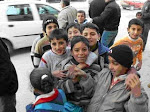I'm not sure what I expected on January 9th as we arrived in the village of At-Tuwani in the South Hebron Hills. What I discovered was about a dozen homes in a small, resilient community. But it was also a misleading discovering. If I told you that Tuwani only gets electricity for about four hours each evening from a generator and that families have no running water but must rely daily on trips to the well or cistern, you might imagine a village of a past decade in a desert far away. In reality, Tuwani could have consistent electricity and running water in each home. If you visited one of the neighboring settlements of ideological Israelis next to At-Tuwani, you would stumble upon manicured lawns with flowering bushes, green trees, and possibly even a swimming pool. It's not the remoteness that is limiting At-Tuwani's resources; it is the Israeli government and continued occupation of the West Bank.
In this context, under this constraint of what many Americans (including myself) consider basic resources, I was unsure of what the atmosphere of the village would be like. But instead of finding fear or discouragement, we were welcomed with kindness, hospilitity, and a pride for this land that could not be taken away.
One of the most enjoyable adventures I had in At-Tuwani actually related to the lack of running water. On the morning of the 10th, a few of us ventured out with our leader to the village well, to gather the daily water. Coming from the Pacific Northwest, water scarcity is not something with which I am familiar. Feeling very much like a newbie and especially like a spoiled American, I helped grab the empty containers and bottles and headed over to the cement slab covering the village well. Upon opening the metal door, we all eagerly peered in, while Sarah reassured us that if we fell in, there were indeed metal rungs along the side for us to climb up. Not feeling too reassurred, one of us gently lowered our red bucket down to the water, perhaps 30 feet below. At this point it was quite good that our experienced leader intervened, seeing that our first several scoops and haul ups of the bucket produced only a few inches of water. More gusto was required. After we mastered the art of hurling the bucket vigorously into the well and hauling it up hand over hand, we filtered it using a hankerchief, packed up our bottles and began the journey back up the hill to the home where we were meeting. For us it was a fun adventure. In a week or so, we'll return to our homes and the convenience of running water with the twist of a faucet. It is hard to realize that while we'll be doing this, the people (specifically the women) of At-Tuwani will continue to make daily trips to their well to collect water, not because running water is not logistically possible, but because of the refusal of the occupying government to provide basic services to these people who have lived on this land for generations.
On the 11th, our group left the small village of At-Tuwani to return to Al-Khalil. While I felt I had gained a new and valuable life skill from drawing water that one morning, I also can't help but be startled to realize that At-Tuwani is not unique in its oppression. I have learned that it is one village to represent villages and people all over the West Bank.
Thursday, January 14, 2010
Subscribe to:
Comments (Atom)



